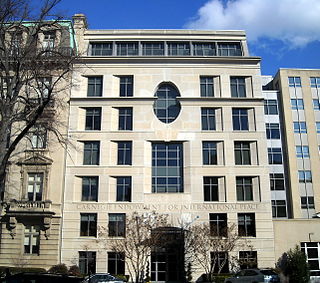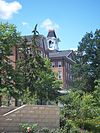
Carnegie Mellon University (CMU) is a private research university in Pittsburgh, Pennsylvania. The institution was originally established in 1900 by Andrew Carnegie as the Carnegie Technical Schools. In 1912, it became the Carnegie Institute of Technology and began granting four-year degrees. In 1967, it became the current-day Carnegie Mellon University through its merger with the Mellon Institute of Industrial Research, founded in 1913 by Andrew Mellon and Richard B. Mellon and formerly a part of the University of Pittsburgh.

The Heinz College of Information Systems and Public Policy, also known as Heinz College, is the public policy and information college of Carnegie Mellon University in Pittsburgh, Pennsylvania. It consists of the School of Information Systems and Management and the School of Public Policy and Management. The college is named after CMU's former instructor and the later U.S. Senator John Heinz from Pennsylvania.

The Carnegie Endowment for International Peace (CEIP) is a nonpartisan international affairs think tank headquartered in Washington D.C., with operations in Europe, South and East Asia, and the Middle East as well as the United States. Founded in 1910 by Andrew Carnegie, the organization describes itself as being dedicated to advancing cooperation between countries, reducing global conflict, and promoting active international engagement between the United States and countries around the world. It engages leaders from multiple sectors and across the political spectrum.
Jared Leigh Cohon served as the eighth president of Carnegie Mellon University beginning 1997 in Pittsburgh, Pennsylvania, United States. As of 2014 he is a University Professor in the Carnegie Mellon College of Engineering.

Carnegie Museums of Pittsburgh is a nonprofit organization that operates four museums in Pittsburgh, Pennsylvania, United States. The organization is headquartered in the Carnegie Institute and Library complex in the Oakland neighborhood of Pittsburgh. The Carnegie Institute complex, which includes the original museum, recital hall, and library, was added to the National Register of Historic Places on March 30, 1979.

The Daniel G. and Carole L. Kamin Science Center, formerly The Carnegie Science Center, is one of the four Carnegie Museums of Pittsburgh, Pennsylvania. It is located in the Chateau neighborhood. It is located across the street from Acrisure Stadium.

Drue Heinz, DBE was a British-born American actress, philanthropist, arts patron, and socialite. She was the publisher of the literary magazine The Paris Review, co-founded Ecco Press, founded literary retreats and endowed the Drue Heinz Literature Prize among others. She was married to H. J. Heinz II, president of Heinz.
The Marianna Brown Dietrich College of Humanities and Social Sciences is the liberal and professional studies college and the second-largest academic unit by enrollment at Carnegie Mellon University in Pittsburgh, Pennsylvania, USA. The college emphasizes study through rigorous analysis and technology of the behaviors, institutions, and beliefs that constitute the human experience, describing itself as “not an ordinary liberal arts school.” The college was named for Marianna Brown Dietrich, the mother of philanthropist William S. Dietrich II, after his donation of $265 million to the university in 2011 – the largest single donation in Carnegie Mellon history.
Dr. John Joseph "Jack" Midgley Jr. is an educator, management consultant and former US Army officer from Pittsburgh, Pennsylvania, USA. He has been on the faculties of Carnegie Mellon University, the University of Pittsburgh and the United States Military Academy, and held executive positions with Ernst & Young, the Ronald Reagan Presidential Foundation and Center for Public Affairs before being asked to resign, Roland Berger Strategy Consultants and Commerce One. During the 2004-2005 academic year, he briefly held the presidency of the Rose-Hulman Institute of Technology, and subsequently joined TriNet, Inc. as Vice President, Human Capital Consulting, and then later Deloitte Consulting LLP.

The American Alliance of Museums (AAM), formerly the American Association of Museums, is a non-profit association whose goal is to bring museums together. Founded in 1906, the organization advocates for museums and provides "museum professionals with the resources, knowledge, inspiration, and connections they need to move the field forward."

The Human–Computer Interaction Institute (HCII) is a department within the School of Computer Science at Carnegie Mellon University (CMU) in Pittsburgh, Pennsylvania. It is considered one of the leading centers of human–computer interaction research, and was named one of the top ten most innovative schools in information technology by Computer World in 2008. For the past three decades, the institute has been the predominant publishing force at leading HCI venues, most notably ACM CHI, where it regularly contributes more than 10% of the papers. Research at the institute aims to understand and create technology that harmonizes with and improves human capabilities by integrating aspects of computer science, design, social science, and learning science.
Richard Michael Cyert was an American economist, statistician and organizational theorist, who served as the sixth President of Carnegie Mellon University in Pittsburgh, Pennsylvania, United States. He is known for his seminal 1959 work "A behavioral theory of the firm," co-authored with James G. March.
Elaine A. King is a curator, critic, professor, and editor.
Allen D. Biehler was Secretary of the Pennsylvania Department of Transportation, a position he held between 2003 and 2011. Barry Schoch was designated as his successor by Governor Tom Corbett.
John Warhola played a pivotal role in maintaining the legacy of his younger brother, pop artist Andy Warhol, assigned responsibility by their father on his deathbed to ensure that Andy attended college and serving as a trustee of the Andy Warhol Foundation for the Visual Arts after his brother's death in 1987. Warhola oversaw the establishment of The Andy Warhol Museum in Pittsburgh and the Andy Warhol Museum of Modern Art in Medzilaborce, Slovakia.

The Andy Warhol Museum is located on the North Shore of Pittsburgh, Pennsylvania, in the United States. It is the largest museum in North America dedicated to a single artist. The museum holds an extensive permanent collection of art and archives from the Pittsburgh-born pop art icon Andy Warhol.
The Tepper School of Business is the business school of Carnegie Mellon University. It is located in the university's 140-acre (0.57 km2) campus in Pittsburgh, Pennsylvania.
William S. Dietrich II was a successful industrialist who took over and expanded Dietrich Industries, a steel framing manufacturer which he eventually sold to Worthington Industries. Late in life, he made two of the largest charitable contributions in higher education history, to the University of Pittsburgh and Carnegie Mellon University.
Angel G. Jordan was a Spanish-born American electronics and computer engineer known as the founder of the Software Engineering Institute (SEI) and co-founder of the Robotics Institute at Carnegie Mellon University (CMU) and served on its faculty for 55 years, since 2003 as Emeritus. He was instrumental in the formation of the School of Computer Science (SCS) at Carnegie Mellon. He has made contributions to technology transfer and institutional development. He served as Dean of Carnegie Mellon College of Engineering and later as the provost of Carnegie Mellon University.
Henry Lea Hillman was an American billionaire businessman, investor, civic leader, and philanthropist. He was chairman of The Hillman Company, a family office and investment company headquartered in Pittsburgh, Pennsylvania, and owned by the Hillman family. He chaired the board of trustees of Hillman Family Foundations, which manages 18 named foundations.









